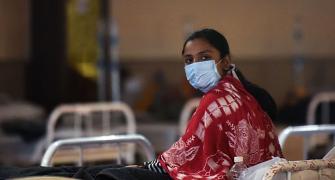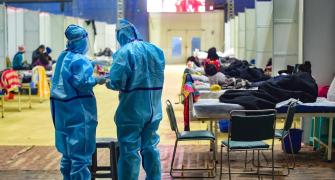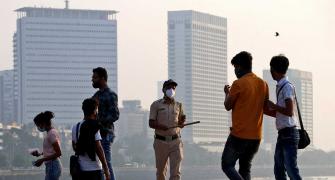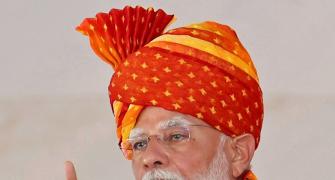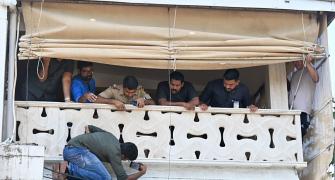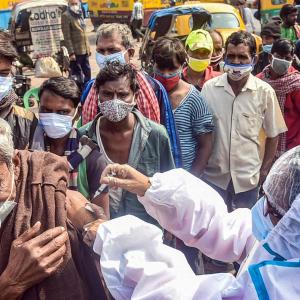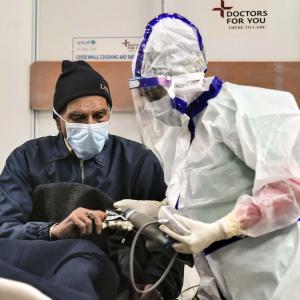'Serial testing is much more valuable than a single test which reflects just a point in time.'

We have been existing awkwardly with COVID-19 for 25 dreary months.
Scientists and doctors are still differing about when this disease will/if it has reached endemic or ordinary flu status.
As it stands, COVID-19 cannot yet be dubbed as harmless as a regular flu.
This was stated on Monday by World Health Organization Director General Dr Tedros Adhanom Ghebreyesus: 'There are different scenarios for how the pandemic could play out and how the acute phase could end. But it's dangerous to assume that Omicron will be the last variant or that we are in the endgame. On the contrary, globally, the conditions are ideal for more variants to emerge'.
So, at the moment, now that we are vaccinated, waiting patiently for boosters, the best that we can do is to live along with SARS-CoV-2, the virus that causes COVID-19, in a better, more enlightened and safer manner by using the tools of protection that have been proven, over the last two years, to be most useful and reasonably foolproof.
A suitable mask, preferably an N95, is a primary tool.
The second most important tool accessible to us is the rapid antigen test, available very conveniently as a self-test home kit.
It is now readily found at chemists and online and this antibody test can be bought over the counter. It's priced at between Rs 175 to Rs 250 per test and should be stocked in your home.
Some of the more well-known brands available are Panbio by Abbott Diagnostics, Covifind by Meril Diagnostics and, Coviself by Mylab. ICMR has published a comprehensive list of the tests available and approved for India. The list can be found here (external link)
Key questions: How does the rapid antigen test work? What would you use it for?
If you have very obvious COVID-19 symptoms -- be they the cold-cough-sniffle-backache symptoms of Omicron or the severer no-taste-no-smell-high-fever-acute-exhaustion indicators of the Delta variant -- it is best that you immediately contact a lab and schedule an RT-PCR test. You might like to do a preliminary rapid antigen test too. But even if that test result comes negative, an RT-PCR test is critical.
So, when is a rapid antigen test done and how is it useful?
A rapid antigen test is valuable when you don't have COVID-19 symptoms, but:
- You have been mildly exposed to someone who has tested to be COVID-19 positive.
- You were exposed to an unusually crowded, too-many people, closed room situation, perhaps without a mask, where the chances of someone having Omicron/Delta is high.
- You are boarding a flight, then maybe take as a precautionary test.
- You got off a flight and your fellow passenger/s was not following mask protocols.
- You live with someone more vulnerable to COVID-19 -- suffering comorbidities or who is elderly, even if he/she/they and you are vaccinated -- and you went and stepped out somewhere to meet/dine with a bunch of people, without a mask, and you would not like to bring the disease back home.
- You are planning a multi-household visit, then take as a precautionary test.
- You play a contact sport without a mask.
That's when you can take out your home kit and test yourself and have a result, voila, in just 15 minutes.
If it is a precautionary test, and it is negative, you are free to proceed with the social visit or the domestic flight you had planned.
If it is a post-exposure test and it is negative, you would need to repeat the test after 48 to 72 hours, because as Dr Amish Adalja, infectious disease specialist and adjunct assistant professor, Johns Hopkins Bloomberg School of Public Health, Baltimore, points out: "Serial testing is much more valuable than a single test which reflects just a point in time." Antigen testing is more reliable if there is a gap of a few days between tests.
If you test positive, there is a very high chance you have COVID-19 and the result should be confirmed with an RT-PCR lab test.
Note: Also, if you are taking a test after possible exposure, don't take it immediately on reaching home -- wait 48 hours before taking your first rapid antigen test and take precautions in the meantime.

Can you take rapid antigen tests frequently?
Various governmental health authorities across the world, including India's ICMR, suggest taking regular antigen tests, if in high-risk surroundings.
According to an article on rapid antigen testing* in the Journal of the American Medical Association, one can easily test two or three times a week as 'a powerful and convenient way for individuals to screen for COVID-19 infection'.
Says Dr Gagandeep Kang, a leading COVID-19 expert and professor of microbiology, Wellcome Trust Research Laboratory, Christian Medical College, Vellore: "The application of RATs is very dependent on the situation and increasing the frequency of use increases their value. I don't think taking a test when boarding a flight makes sense, but if there is known exposure then testing on Day 3 and Day 6, in the absence of symptoms, and the presence of vulnerable individuals whom you would like to protect, makes sense."
How to buy a rapid antigen test in India
Several brands of rapid antigen tests, approved by ICMR (as per the list above), are found in the Indian market. But choosing the right test is still crucial emphasises Dr G V S Murthy, director, public health, Public Health Foundation of India, Hyderabad and professor in public health disability with the International Centre for Eye Health at the London School for Hygiene and Tropical Medicine.
Dr Murthy explains that it is important to read the literature/brochure for the test online before purchasing, to check the sensitivity and specificity of the rapid antigen test.
Says Dr Murthy: "Yes, the ICMR has released a list, but how much testing is the ICMR is doing (before approving). When ICMR gives a list, it should give along with it how much is the sensitivity and specificity of each of those tests. That is what a body like ICMR is supposed to do. It should not shirk its responsibilities. Just giving a list does not end the matter.
"If you go by the guidelines issued in countries like Ireland (EU), the United Kingdom, the US, there is a clear-cut definition of what rapid antigen test to use. It must have a very high sensitivity of more than 80 per cent and a specificity of more than 90 per cent.
"What does sensitivity mean? The ability to pick up a positive infection if you are infected -- that is called sensitivity and that should be about 80 per cent. Specificity is if the test tells you that you are negative, then it should be negative in 90 per cent of the cases. High sensitivity and specificity are critical."
Abbott Diagnostics's Panbio rapid antigen test, for instance, meets this criterion, as per their online brochure and articles on test sensitivities in The Lancet**.

RT-PCR vs rapid antigen test and reliability
Explains Dr Priya Sampathkumar, infectious disease specialist and the chair of the infectious prevention and control department, Mayo Clinic, Rochester: "Although the antigen tests are not as sensitive as PCRs, a negative antigen test correlates well with lack of infectivity. A negative antigen test and no symptoms equals very good likelihood that you are not infectious to others."
An RT-PCR test, which is a diagnostic test and not an antibody test, has been always considered the gold standard COVID-19 test because of its accuracy.
On the other hand, rapid antigen tests are/were not considered as reliable. The reason: If someone suspected to have COVID-19 has a tinier amount of the virus in their body -- the virus is definitely there, but there is less viral load -- an antigen test may not detect it, being less sensitive. And he would test negative.
Says Dr Adalja: "I think it is wrong to describe their reliability the way you do. Rapid antigen tests are very good at answering the question: 'Am I contagious?'
"Their best use is for screening individuals to know their status when they have no symptoms because the test will be positive if they have sufficient virus in their nose or mouth to infect other people.
"People call them unreliable because they don't actually take a step back and determine what question they are asking of the test. If a person has symptoms and a rapid test is negative, they need to figure out what is wrong with him and it may be COVID-19 with a lower viral load or it could be another respiratory virus.
He adds: "I do think that they should be deployed to help minimise risk and people should take them frequently depending upon their risk tolerance."
Dr Adalja's view suggest that both types of tests have their uses in certain situations.
That can be summarised thus:
A positive test, be it an antigen one or an RT-PCR, must be taken as a positive test.
While a negative RT-PCR test is definitely a negative. But a negative rapid antigen test might require follow up rapid antigen tests and/or a back-up RT-PCR test.
Thus, a rapid antigen test is a nifty tool to store in your home in COVID-19 times.
* Antigen Testing Every 3 Days Is Highly Sensitive for SARS-CoV-2 Antigen Testing Every 3 Days Is Highly Sensitive for SARS-CoV-2 (external link)
** COVID-19 Ag Rapid Test Device (external link) and Real-life validation of the Panbio COVID-19 antigen rapid test (Abbott) in community-dwelling subjects with symptoms of potential SARS-CoV-2 infection (external link)
And Comparison of seven commercial SARS-CoV-2 rapid point-of-care antigen tests: a single-centre laboratory evaluation study (external link)
***What ICMR says: All asymptomatic direct and high-risk contacts (in family and workplace, elderly ≥ 65 years of age, immunocompromised, those with co-morbidities etc) of a laboratory confirmed case to be tested once between day 5 and day 10 of coming into contact.
Feature Presentation: Ashish Narsale/Rediff.com

